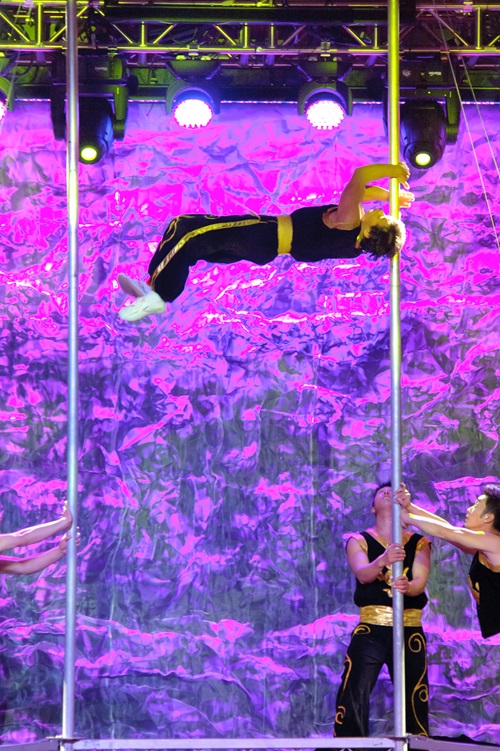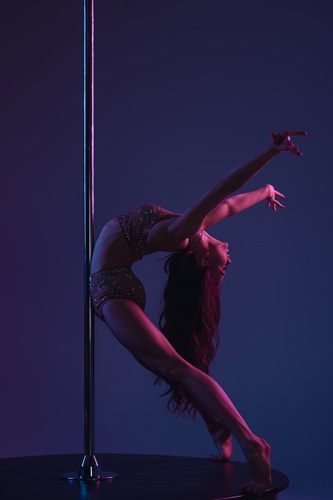
Photo © Wisky | Dreamstime.com
Few sports are probably less understood than pole gymnastics. The first inclination is to relegate the sport to a form of glorified pole dancing, but that would be misguided.
Generally speaking, pole gymnastics encompass acrobatic and dance movements performed on a vertical pole. The sports emphasizes strength, flexibility and creativity — much like traditional gymnastics, figure skating, artistic swimming and breaking (all of which are popular Olympic sports, by the way).
Which is one reason why advocates and participants believe pole gymnastics should be part of the Olympics.
Back in 2017, “pole dancing” (as Reuters.com called it) was recognized as a sport by the now-defunct Global Association of International Sports Federation (GAISF), “after being essentially confined to cabarets and strip clubs, with some of the physically-demanding moves — Jade Split, Marion Amber — being named after famous strippers.”

Last year, French Dancing Federation president Charles Ferreira said the sport still has a long way to go to reach Olympic status. “Maybe in 10 years or something. For this to work it needs a social media presence, it needs to reach a young audience,” he told Reuters.
Still the International Pole Sports Federation (IPSF) already has done a lot of the, um, leg work.
According to Slate.com last summer:
Since [its founding in 2009], the federation has been hugely successful. They’ve helped create 25 national federations that they govern, put on an annual international competition (called the World Pole & Aerial Championships), and even helped pole sports achieve Olympic “observer status” in 2017 (a now-defunct title that meant pole was provisionally regarded as a sport).
The IPSF has also drawn up meticulous rules and regulations from scratch — which, since 2011, have grown from 20 moves and 25 pages to hundreds of moves and 450 pages — as well as scoring and judging criteria which take into account complexity of movements, choreography, style and expressiveness.
The sport, which requires a level of strength, coordination, and artistry that would leave most athletes breathless, has also historically been dominated by women. By mid-2011, an estimated 95 percent of pole sports athletes were women and girls, though men’s participation increased by more than 70 percent when male categories were opened in 2017. According to the IPSF, there are now more than 3,000 athletes — aged 10 to 75 — competing worldwide, each of whom are judged in line with Olympic standards.
Yet, IPSF co-founder and then-president Katie Coates told Slate that the battle for Olympic recognition has been “a long-winded, misogynistic, horrific road to hell,” adding that it might be an unattainable status “unless you’re a man over 50 who’s [willing to] kiss the butts of the right people.”

With the recent election of Kirsty Coventry as the first woman to head the International Olympic Committee, leaders of the sport are no doubt hoping for some movement on the sport’s status. But there has been little indication that pole sports are among Coventry’s initial top priorities.
Still, there are reasons for optimism, as the incoming president does bring a new perspective to what is widely considered to be the most important position in all of global sports.
“It's a passion for me to be able to challenge the status quo, break down barriers,” Coventry, who officially takes office in June, told Olympics.com following her election in Greece on March 20. “We've had incredible women come before us. I've had incredible women around me my entire life that I'm so grateful to for showing me how to never give up on any of their dreams.”
“I truly believe that we will one day be in the Olympics, and I will continue to stand on my soapbox and tell anyone who’ll listen about the merits of our sport,” Coates told Slate, hours before her resignation as president of the IPSF was officially announced. “If you spent one day in my shoes and saw the amazing athletes who’ve dedicated their lives to this — and I’m talking people having babies out of season so they can make sure they’re ready for the next World Championships — [you’d think they should] be recognized on par with every other athlete on the planet. … I guarantee, love it or hate it, if you said, ‘At 12 p.m. on the first day of the Olympic Games, it’s the first-ever pole competition,’ the TV [ratings] would crash.”

